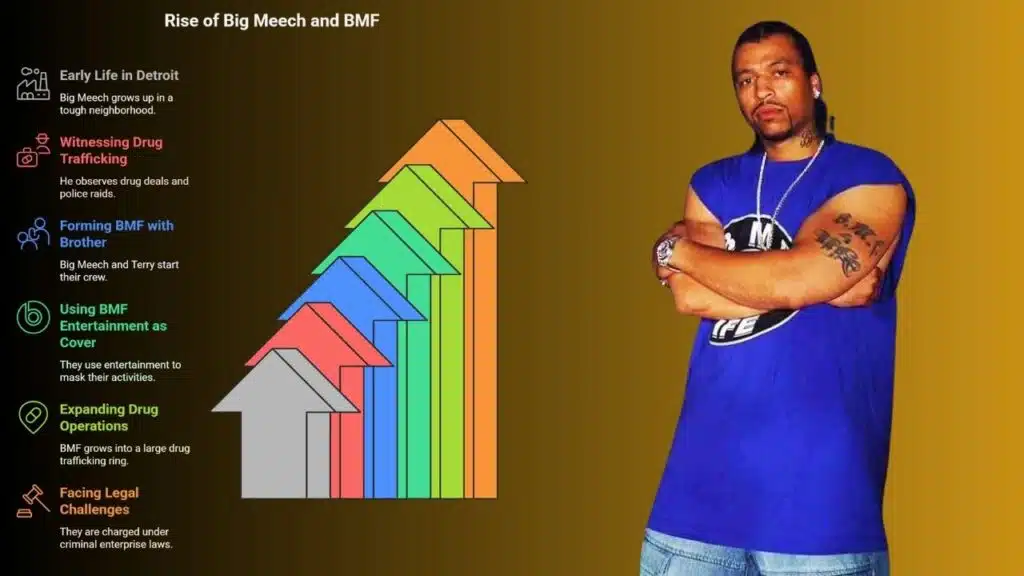Many folks wonder where is big meech from and still find mixed info online. They scroll through blogs, YouTube clips, and rumors. They crave a clear start to his story. They need simple facts, not hype.
Big Meech, born Demetrius Flenory, grew up in Detroit, Michigan. This post will trace his rise with the Black Mafia Family, his role in drug trafficking, and the fall that led to a federal investigation.
You will get a clear timeline and key insights. Read on.
Key Takeaways
- Demetrius “Big Meech” Flenory was born on June 21, 1968, in Detroit, Michigan, and co-founded the Black Mafia Family (BMF) with his brother Terry “Southwest Tee” Flenory in 1985.
- By 2000, BMF ran a multi-state cocaine pipeline that grossed over $270 million a year, with daily drug revenue of $300,000–$500,000 and a peak net worth of $100 million by 2005.
- The brothers used a record label, BMF Entertainment, as a front to launder millions and signed artists like T.I., Rick Ross, and Young Jeezy to mask cocaine profits.
- In 2005, DEA agents launched Operation Motor City Mafia, raiding 25 BMF sites across Detroit, Atlanta, and Chicago, and seizing $6 million in cash, luxury cars, and bulk cocaine.
- A federal grand jury indicted Big Meech under the Continuing Criminal Enterprise statute in 2008, and he received a 30-year prison sentence (U.S. Dept. of Justice, 2008).
Origins of Big Meech and the Black Mafia Family
Demetrius “Big Meech” Flenory grew up in a tough Detroit neighborhood, where he watched crews hustle hard and cash flow like a river. He teamed with his brother Terry “Southwest Tee” Flenory to build the Black Mafia Family, using cocaine distribution and money laundering under the looming Drug Enforcement Administration heat.
Birthplace: Detroit, Michigan
Big Meech arrived on June 21, 1968, in Detroit, Michigan. He grew up where car factories met empty lots, and walls whispered the crack epidemic. Families struggled with poverty and job loss.
Street corners turned into hubs of drug trafficking and money laundering.
He watched dealers move kilos while cops ran Drug Enforcement Administration raids. He then teamed with his brother to launch a Black Mafia Family crew. They used BMF Entertainment as a cover for cocaine distribution.
Judges charged them under the continuing criminal enterprise statute.
Early life of Demetrius “Big Meech” Flenory
Demetrius “Big Meech” Flenory first saw daylight in Detroit, Michigan. He grew up on a rough side, where hope felt thin. Local blocks taught him street codes and sharp instincts.
At 16, he teamed with his brother Terry “Southwest Tee” Flenory in low-level cocaine distribution and money laundering. They ran small drug drops in alleys to cover bills and school fees.
Neighbors whispered about their fast moves.
In the late 1980s, he began working with larger drug trafficking rings. Quick meets and secret payphones became routine. A friend recalls, “Me and Big Meech chased that bag from dusk to dawn.” The Black Mafia Family brand hit the streets by 1985.
BMF Entertainment masked their real trade behind flashy beats. Each cash run taught him more about organized crime.
Formation of the Black Mafia Family (BMF)
Big Meech and Terry “Southwest Tee” Flenory kicked off BMF in Detroit in the mid-1980s, hitting the streets with bold hustle. They funneled cash through BMF Entertainment, a record label built to mask money laundering and narcotics trafficking.
Founding in the mid-1980s
Young brothers Demetrius “Big Meech” Flenory and Terry “Southwest Tee” Flenory set roots in Detroit around 1985. They built a small drug trafficking crew on the East Side. Cocaine distribution fed their growth, and they funneled cash through money laundering schemes.
BMF Entertainment masked transactions behind music parties and club nights.
Partnership with Terry “Southwest Tee” Flenory
Demetrius “Big Meech” Flenory joined brother Terry “Southwest Tee” Flenory to form a strong team. Big Meech moved to Atlanta, while Southwest Tee ran the show in Los Angeles.
They built the Black Mafia Family around 1985. They used BMF Entertainment as a record label to hide drug trafficking and money laundering.
They signed artists like T.I. and Rick Ross under the BMF record label. Those deals funneled cash from cocaine distribution and drug sales into music. That mix of hip-hop culture and crime soon drew a federal investigation.
The Rise of BMF
They launched a record imprint, lured Rick Ross, Young Jeezy, and fed Detroit’s beat scene, all while they ran a cocaine distribution ring across state lines. They stacked millions a day, cleaned cash through mixtape drops, and let the streets hum with their name.
Expansion into drug trafficking
Demetrius “Big Meech” Flenory grew his Detroit crew into a full-blown cocaine pipeline, sending kilos across state lines. Next, the Black Mafia Family hit Chicago and Atlanta, then funneled loads deep into the South.
That move sparked massive drug trafficking through Michigan, Georgia, and Texas. BMF runners hid packages in buses, cars, and private planes to dodge cops and rivals.
In 2000, BMF booked over $270 million every year from cocaine sales. Money laundering washed those profits through nightclubs, BMF Entertainment record deals, and flashy car fleets.
Federal agents picked up the paper trail fast. Demetrius “Big Meech” Flenory faced a sweeping federal investigation.
BMF Entertainment as a front
BMF Entertainment opened as a record label in the mid-2000s. The label signed Bleu DaVinci and linked with Young Jeezy and musician T.I. It masked drug trafficking cash. Leaders under Demetrius “Big Meech” Flenory funneled millions from cocaine distribution into studio budgets.
Prosecutors spotted odd bank accounts and false revenue sheets. They traced money laundering through sound rooms and tax filings. The front lit BMF in hip-hop culture while hiding the drug profits.
Financial Insights: How Much Did Big Meech Make a Day?
Readers get a clear view of Big Meech’s daily haul.
| Metric | Value | Notes |
|---|---|---|
| Peak Net Worth | $100,000,000 | Built by 2005 |
| Daily Drug Revenue | $300,000–$500,000 | Experts estimate at height |
| Event Spending | $50,000 | Live tigers and elephants at bash |
| Entertainment Front | $10,000 | Money moved through music arm |
| Concept Used | Revenue | Core profit idea |
| Tool Used | Spreadsheet | Model daily intake |
The Fall of BMF
Federal agents hit BMF safe houses under Operation Motor City Mafia, seizing stacks of cash, cocaine, and luxury cars. Explore the prosecutors’ court records to see how the cocaine distribution network and money laundering operation fell apart.
Federal investigations and Operation Motor City Mafia
DEA agents struck in 2005, launching Operation Motor City Mafia against the Black Mafia Family. They hit stash spots across Detroit and seized heavy loads of cocaine and piles of cash.
Wiretaps exposed calls on drug trafficking and money laundering linked to BMF Entertainment. The raid froze assets tied to Demetrius “Big Meech” Flenory and his brother, Terry “Southwest Tee” Flenory.
Authorities booked more than twenty suspects the same day.
A grand jury indicted both brothers in 2008 for conspiracy to distribute cocaine. Judges sent them to a federal prison for thirty years. Rappers like Rick Ross, T.I. and Young Jeezy buzzed about the bust.
Fans later tuned in to the bmf series and to films by Mara Shalhoup. The saga still shapes talk of hip-hop culture and drug cartels.
2005 raids, arrests, and indictments
The 2005 raids shook Detroit’s streets. Officers moved in with one goal: stop BMF’s cocaine trade.
- Operation Motor City Mafia kicked off in early 2005 under a major federal investigation, using wiretaps and undercover work.
- Federal officers raided 25 BMF sites in Detroit, Atlanta, and Chicago, seizing $6 million in cash, jewelry, luxury cars, and pounds of cocaine.
- Investigators arrested Demetrius “Big Meech” Flenory’s inner circle, charging them with drug trafficking, money laundering, and running a criminal organization.
- Flenory faced a 30-count indictment for cocaine distribution, money laundering, and racketeering, after he surrendered at a federal correctional institution.
- Prosecutors named BMF Entertainment as the main front, tying its record label funds to hidden drug profits.
- Judges accepted plea deals for 15 defendants, handing out decades in prison and seizing property.
- The raids marked a turning point, halting the Black Mafia Family’s rise in drug trafficking.
Legacy and Cultural Impact
BMF sparked waves in hip-hop culture, as its record label cut new tracks and set fresh standards. Fans still binge the TV drama and debate its money-laundering tactics in criminal justice reform circles.
Influence on hip-hop culture
Rappers T.I., Young Jeezy and Rick Ross shout out BMF in their songs. They rap about demetrius “big meech” flenory and his empire. Their bars focus on drug trafficking schemes and money laundering moves.
They paint pictures of sleek cars, icy chains and wild parties. This record label front, bmf entertainment, broke new ground in hip-hop culture.
A cable channel unveiled the Starz series “BMF”, produced by 50 Cent. It shows crew ranks and lavish deals. Actors drive exotic cars and flash heavy jewelry. Viewers trace each tier in the black mafia family.
They spot real-life names like Mara Shalhoup and Jacob the Jeweler. Musicians now craft beats around that saga.
Representation in popular media
Mara Shalhoup’s book hit shelves on March 1, 2010. It spans 304 pages and is priced at $24.99. St. Martin’s Press released it on analog audio cassettes, compact discs, MP3 CDs, and e-books.
The text charts Big Meech’s rise from Detroit streets, detailing how BMF Entertainment concealed cocaine distribution and money laundering.
The BMF TV series brings those true events to the screen. It explores the federal investigation and Operation Motor City Mafia. Actors portray Demetrius “Big Meech” Flenory and Terry “Southwest Tee” Flenory.
The show spotlights drug trafficking, the 2005 raids, and the justice system. Viewers catch nods to Young Jeezy and Rick Ross as supporters of the Black Mafia Family.
Takeaways
Detroit roots shaped Big Meech’s path. He built a drug trafficking network with his brother. They used a record label to launder money. Law enforcement shut them down in 2005, with raids and indictments.
Today, his story still echoes in hip-hop, proving crime can glam up with heavy costs.
Discover the astounding financial empire of Big Meech by exploring our detailed analysis on how much Big Meech made a day.
FAQs
1. Where is Big Meech from?
He grew up in Detroit, Michigan, in a tough neighborhood by the river. He and his brother, Terry, later moved to Atlanta and built the Black Mafia Family empire there.
2. How did Big Meech start the Black Mafia Family?
He sold drugs on street corners, even wearing a southwest tee, and used the cash to launch BMF Entertainment. The record label moved into hip-hop culture, and he teamed with artists to blend cocaine distribution with music.
3. What crimes did the Black Mafia Family commit?
They ran large-scale drug trafficking and money laundering. They oversaw cocaine sales, drew federal investigation, and hid cash through complex schemes.
4. Who brings the story to life in the BMF series?
Demetrius “Big Meech” Flenory Jr. steps in as his own dad, alongside Melvin “T.I.” Harris as Darius. You’ll spot Young Jeezy and Rick Ross in key scenes, Bleu Davinci on the soundtrack, plus Mara Shalhoup and Brittany K. Barnett in legal roles.
5. What led to Big Meech’s arrest?
Federal agents tracked the money laundering and cocaine distribution. He pleaded guilty, and the justice system moved fast to lock him up.
6. How did time in a halfway house shape his personal growth?
He landed in a halfway house after prison, where he faced his past. He started talking about criminal justice reform, and he worked on real personal growth, one day at a time.







































